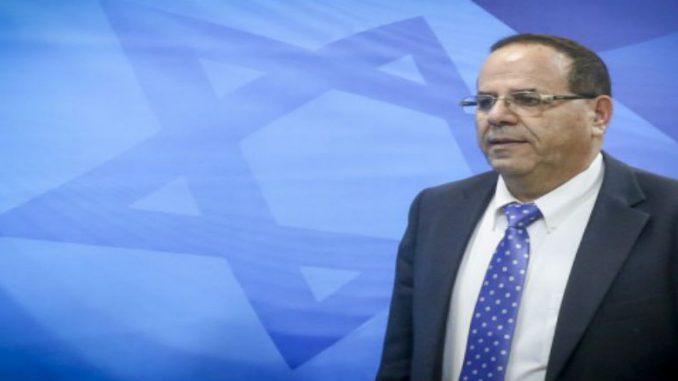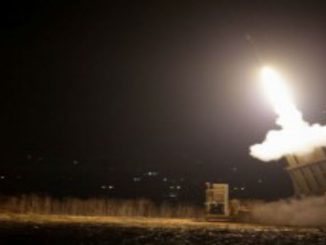
Israeli Minister Ayoub Kara unveiled Abdel Fattah al-Sisi’s plan to establish a Palestinian state in Gaza and Sinai.
Kara was referring to a reported 2014 Egyptian proposal to resettle Palestinian refugees in a large tract of land in the Sinai Peninsula to be annexed to the Gaza Strip.
However, the the plan was rejected by the Mahmoud Abbas the leader of the Palestinian Authority. Also, the Egyptian officials have denied these claims. But the proposal was welcomed by Israeli ministries as they refuse the efforts to create a Palestinian state in the West Bank.
The report revived once again when Israeli media reported that Minister Ayoub Kara said on Tuesday that “Prime Minister Benjamin Netanyahu and US President Donald Trump will discuss a plan to establish a Palestinian state in Gaza and the Sinai Peninsula and not in the West Bank,”according to the Time of Israel(Israeli News site).
A day before the first meeting between Netanyahu and Trump, Kara wrote on his twitter account that the two would give their support to a proposal reportedly put forward by Abdel Fattah al-Sisi.
Kara wrote,“Trump and Netanyahu will adopt the plan of Egypt’s Sisi. A Palestinian state in Gaza and Sinai. Instead of Judea and Samaria,” he added,“This is how we will pave a path to peace, including with the Sunni coalition.”
The Times of Israel said that “while Netanyahu has declined to signal support for an independent Palestinian state in recent weeks, officials insist he still backs a form of the two-state solution with full demilitarized Palestinian autonomy in much of the West Bank. He has never expressed support for the Sinai plan, however.”
But Kara said that “he had discussed the issue with Netanyahu on Sunday in an effort to convince him to push the plan,” according to the Israeli News Site.
He said, “There is no other realistic option. We cannot have a state in Judea and Samaria. This is the only path.”
Kara claimed that Netanyahu agreed with him and said he would bring up the issue with Trump. “The issue is on the agenda,” he added.
Last month,Kara,a veteran Likud MK, was appointed minister without portfolio in the Prime Minister’s Office after having served as deputy minister of regional cooperation since 2015.
Kara’s comments can be viewed as a direct statement from the PMO. However, Israeli government officials declined to comment on the statements.
Later, a spokesman for Kara appeared to backpedal on some of the claims, saying that the minister was stating what he “believes” will happen and not revealing policy decisions.
Since al-Sisi military coup against Egypt’s first democratically elected President Mohamed Morsi in 2013, the Egyptian-Israeli relations have flourished in an unprecedented way.
Israel has allowed modifications to the security annex of the Camp David Accords.In two dozen occasions” Israel allowed Egypt to deploy troops and equipment, including aircraft that were previously prohibited by the treaty,”said David Schenker -the director of the Program Arab Politics at Washington Institute, in an interview last December 2016.
On the other hand, the Israeli Air Force is taking part in the attacks against ISIS in Sinai and the IDF’s Military Intelligence Unit 8200 is assisting Egyptian forces to collect and decipher information about Sinai Province, according to foreign reports.
In this context, it was revealed that Israeli drones were given permission by the Egyptians to strike targets in the Sinai Peninsula. This claim came one week after similar remarks that were made by a retired Israeli official, who revealed that Israel’s drone attacks during the previous year were planned in full cooperation with the Egyptian army.
In addition, intelligence sharing about threats in the peninsula is also boomed– in 2016 Major General Yair Golan, Israel’s Deputy Chief of Staff, described it as “unprecedented.”
Moreover, the Egyptian-Israeli relations have also flourished on the political level.
Based on various media reports, the Israeli Prime Minister Benjamin Netanyahu and al-Sisi talk frequently with one another. Some articles even said that they talked “as much as once a week.”
In the same context, al-Sisi sent his foreign minister, Sameh Shoukry, to Jerusalem, to meet with Netanyahu in 2016. Egypt’s foreign minister visit to Israel, which was the first such in nine years, inferred the development in diplomatic relations between both countries.
Schenker explained that both Netanyahu and al-Sisi have also common views regarding few key issues beyond fighting the insurgency in Sinai. One of the main issues that both countries have common views on considering “Hamas as a threat.”



